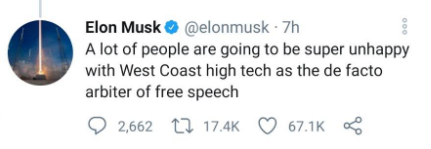Prrrr schreef:Het belangrijkere stuk is de bescherming van de grondrechten en de grenzen daaraan.
Maar we kunnen het er toch over eens zijn dat de rechtelijke macht, tot aan de Supreme Court toe, hier over moet oordelen en niet een ongekozen tech-miljardair die aan niemand verantwoording af hoeft te leggen? We willen toch niet dat Jack en Mark die rol op zich nemen en gaan beslissen wanneer iemands grondrechten beperkt moeten worden omdat de grondrechten van iemand anders overtreden worden? We hangen toch een rechtsstaat aan?
Opiniestuk in the WSJ:
Citaat:
Conventional wisdom holds that technology companies are free to regulate content because they are private, and the First Amendment protects only against government censorship. That view is wrong: Google, Facebook and Twitter should be treated as state actors under existing legal doctrines. Using a combination of statutory inducements and regulatory threats, Congress has co-opted Silicon Valley to do through the back door what government cannot directly accomplish under the Constitution.
It is “axiomatic,” the Supreme Court held in Norwood v. Harrison (1973), that the government “may not induce, encourage or promote private persons to accomplish what it is constitutionally forbidden to accomplish.” That’s what Congress did by enacting Section 230 of the 1996 Communications Decency Act, which not only permits tech companies to censor constitutionally protected speech but immunizes them from liability if they do so.
https://www.wsj.com/articles/save-the-c ... 1610387105
Of wat korter, van Elon Musk:

En van Angela Merkel:







 .
.